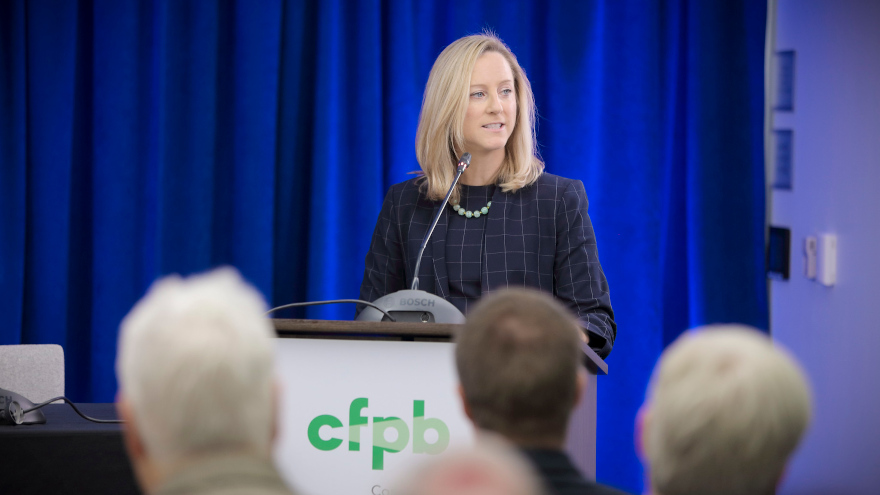Dealerships and finance companies now again can cater to servicemembers and their families just like any other civilian customers who finance a vehicle purchase.
According to a news release distributed on Thursday afternoon, the U.S. Department of Defense has granted a joint petition filed by the National Automobile Dealers Association (NADA) and the American Financial Services Association (AFSA) to withdraw Question and Answer (Q&A) 2 from a December 2017 Interpretive Rule that sought to define the scope of the vehicle financing exclusion to the Military Lending Act (MLA).
The development also came as welcomed news to the National Independent Automobile Dealers Association (NIADA).
The associations explained that Q&A 2 interpreted the MLA in a way that effectively prevented dealers from making Guaranteed Asset Protection (GAP) Waiver coverage available to servicemembers, who previously were able to voluntarily purchase GAP waiver to protect against the personal financial risk that arises when a vehicle is declared a total loss.
As a result, the associations pointed out the Defense Department’s issuance of Q&A 2 “unnecessarily” exposed servicemembers to significant liability by effectively eliminating their ability to adequately protect themselves from incurring financial losses in the event of the total loss of a vehicle.
In January 2018, NADA and AFSA jointly petitioned the Defense Department to withdraw Q&A 2. During the next 25 months, NADA and AFSA worked to demonstrate to the Defense Department that this interpretation created a trio of consequences, including
— Impermissibly narrowed the scope of the motor vehicle financing exclusion that Congress created when it enacted the MLA
— Was issued in an uninformed and procedurally-deficient manner
— Was harming service members and undermining military readiness
NADA and AFSA recapped that they also explained that attempting to comply with the MLA as it relates to credit-related products was not economically feasible because one of the restrictions that applies to non-depository institutions like dealers was their inability to take a security interest in the vehicle collateral.
In explaining its decision to withdraw Q&A 2, the Defense Department stated that it “finds merit in (the security interest) concern and agrees additional analysis is warranted.”
NADA president and chief executive officer Peter Welch and AFSA president and chief executive Bill Himpler issued ajoint statement in response to Defense Department’s action.
“This is a great victory for military service members and their families. It is critically important for members of the military to have the ability to purchase valuable credit-related products such as optional GAP waiver protection when they finance the purchase of a new vehicle,” Welch and Himpler said.
Hudson Cook chairman Michael Benoit elaborated about Thursday’s development.
“Because the effect of the DOD withdrawal is a recognition that auto financing contracts that include credit-related products like GAP waiver are within the scope of the motor vehicle financing exclusion, I expect that auto-finance companies will again feel comfortable purchasing contracts from dealers that include GAP waiver,” Benoit said.
“Because the effect of the DOD withdrawal is a recognition that auto financing contracts that include credit-related products like GAP waiver are within the scope of the motor vehicle financing exclusion, I expect that auto finance companies will again feel comfortable purchasing contracts from dealers that include GAP waiver,” Benoit said.
The National Independent Automobile Dealers Association applauded the Defense Department’s decision, too.
“The removal of this rule is a huge win for the military community and the auto dealers who serve their transportation and automotive finance needs,” NIADA chief executive officer Steve Jordan said in a separate statement. “Further, NIADA is thrilled that revoking Q&A No. 2 signals a continued interest in disavowing inherited bad policy in favor of reasonability and fair thought by the agencies that have operational oversight of the automotive industry.
“It’s a great day when common sense prevails for the driving public, especially those serving our nation in the military,” Jordan added.
In its interpretive rule withdrawing Q&A No. 2, NIADA pointed out the Defense Department said it “finds merit” in creditors’ concerns that they would be “unable to technically comply with the MLA” on such purchases because “the regulation would prohibit creditors from taking a security interest in the vehicle in those circumstances and creditors might not extend credit if they could not take a security interest in the vehicle being purchased.”
While the department did not take a position on that issue, the Defense Department did agree “additional analysis” is needed.
NIADA, which also has been advocating for the withdrawal of Q&A No. 2 for more than two years, looks forward to working with the department as it conducts future analysis.
“NIADA worked tirelessly along with other industry organizations to impress on DoD the importance of removing this unnecessary restriction,” NIADA senior vice president of legal and government affairs Shaun Petersen said. “The withdrawal allows military servicemembers and their families to have access to these much-needed credit-related products.”
Last week, the Consumer Financial Protection Bureau shared their latest action involving collections and time-barred debt disclosures.
The bureau issued a supplemental notice of proposed rulemaking (supplemental NPRM) regarding the collection of time-barred debt. The bureau proposes to prohibit collectors from using non-litigation means such as calls to collect on time-barred debt unless collectors disclose to consumers during the initial contact and on any required validation notice that the debt is time-barred.
Consumer research conducted by the bureau found that a time-barred debt disclosure “helps consumers understand that they cannot be sued if they do not pay.”
Officials added, “That can help consumers make better-informed decisions whether to pay the debt or not.”
Last May, the bureau published a proposal to implement the Fair Debt Collection Practices Act (FDCPA). The May proposal would provide consumers with what the regulator called “clear protections against harassment by debt collectors and straightforward options to address or dispute debts.” The CFPB went on to explain its proposal also would:
— Set “clear, bright-line” limits on the number of calls debt collectors may place to reach consumers on a weekly basis
— Clarify how collectors may communicate lawfully using newer technologies, such as voicemails, emails and text messages, that have developed since the FDCPA’s passage in 1977
— Require collectors to provide additional information to consumers to help them identify debts and respond to collection attempts
The bureau also mentioned its proposal from last May suggested to prohibit debt collectors from “suing or threatening to sue on debts they know or should know are time-barred.” The bureau said it included the “know or should know” standard in its proposal recognizing the concern that, in some instances, debt collectors may be genuinely uncertain whether the statute of limitations has expired even after undertaking a reasonable investigation.
The bureau said it received more than 14,000 public comments on the May proposal. A large number of comments addressed time-barred debt, including the proposed “know or should know” standard.
The CFPB acknowledged that the regulator is analyzing those comments as part of the process of taking final action on the May proposal.
Officials added that its latest supplemental NPRM proposes model language and forms that debt collectors could use to comply with the proposed disclosure requirements.
“As with the May (proposal), the supplemental NPRM also proposes to require disclosures only if a debt collector knows or should know that the debt is time-barred to address debt collector liability if there was too much uncertainty as to whether a debt was time-barred,” officials said.
“The public is invited to submit written comments on the proposed rule, including on the proposed knowledge standard,” they continued. “The bureau will carefully consider all comments received before a final regulation is issued.
The supplemental NPRM is available here.
Finance companies and other service providers involved with auto financing now have a bit more clarity about what the Consumer Financial Protection Bureau constitutes as abusive practices.
Last week, the bureau issued a policy statement providing what the regulator called a “common-sense framework” on how it intends to apply the “abusiveness” standard in supervision and enforcement matters.
Officials reiterated the Dodd-Frank Act is the first federal law to broadly prohibit “abusive” acts or practices in connection with the provision of consumer financial products or services. However, nearly a decade after the act became law, the CFPB acknowledged that uncertainty remains as to the scope and meaning of abusiveness.
“This uncertainty creates challenges for covered persons in complying with the law and may impede or deter the provision of otherwise lawful financial products or services that could be beneficial to consumers,” the bureau said in a news release.
Through this policy statement, the bureau explained that it is providing clarification on how it intends to apply abusiveness in order to promote compliance and certainty. Starting immediately the bureau intends to apply the following principles during supervision and enforcement work by:
— Focusing on citing or challenging conduct as abusive in supervision and enforcement matters only when the harm to consumers outweighs the benefit
— Generally avoiding “dual pleading” of abusiveness and unfairness or deception violations arising from all or nearly all the same facts, and alleging “stand alone” abusiveness violations that demonstrate clearly the nexus between cited facts and the Bureau’s legal analysis
— Seeking monetary relief for abusiveness only when there has been a lack of a good-faith effort to comply with the law, except the Bureau will continue to seek restitution for injured consumers regardless of whether a company acted in good faith or bad faith
“I am committed to ensuring we have clear rules of the road and fostering a culture of compliance – a key element in preventing consumer harm,” CFPB director Kathleen Kraninger said.
“We’ve developed a policy that provides a solid framework to prevent consumer harm while promoting the clarity needed to foster consumer beneficial products as well as compliance in the marketplace, now and in the future,” she continued
In the policy statement that’s available here, the bureau pointed out that it left open the possibility of engaging in future rulemaking to further define the abusiveness standard.
Consumer Bankers Association president and chief executive officer Richard Hunt welcomed the CFPB’s latest actions involving “abusiveness” standard in supervision and enforcement matters.
“Defining the CFPB’s interpretation of its UDAAP authority will assist consumers as well as financial institutions working to meet their customers’ needs by offering safe and sound banking products within a well-regulated industry,” Hunt said in a statement. “We applaud the bureau for issuing this statement that provides regulatory clarity.”
Last year, the bureau held a symposium on abusive acts or practices with academics and practitioners. These experts provided a variety of perspectives on the need and benefits in developing a clearer understanding of the abusiveness standard and most agreed that the bureau should seek to resolve the uncertainty.
Officials noted that the symposium, along with other feedback from stakeholders, was an important part of the process leading to the bureau’s decision to issue the policy statement.
The symposium archived webcast can be found here.
The Auto Care Association welcomed a New Jersey law that the Garden State’s governor recently signed in connection with a new mandate that automakers now have regarding vehicle warranties.
The association recapped that last week New Jersey Gov. Phil Murphy signed into law Senate Bill 1712, which will require OEMs to send a notice to consumers within 90 days of a new-vehicle lease or purchase of their warranty rights under the federal Magnuson-Moss Warranty Act (MMWA). The bill advanced with both chambers of the New Jersey legislature with broad bipartisan support. The bill passed the Senate 31-0 and passed the Assembly 74-0.
“This is another positive step toward educating consumers nationwide on their warranty rights and their ability to get their car serviced at the facility of their choice,”, Auto Care Association director of state government affairs Tom Tucker said in a news release.
“We will continue to work in the legislative and regulatory arenas to promote the MMWA and what it means for consumers,” Tucker continued.
Auto Care Association pointed out the newly signed bill in New Jersey does not change federal law or the MMWA in any way. Rather, it requires OEMs to notify new-vehicle owners in the state of New Jersey of their existing rights.
In addition, the Auto Care Association noted that manufacturers will have to place the same notice online or in the owner’s manual. This is only the second bill requiring consumer notification of MMWA rights to be passed in the country, according to the Auto Care Association.
“Gaining the right to repair your vehicle at the facility of your choosing without voiding the vehicle warranty was only half the battle in protecting consumer choice,” Auto Care Association president and chief executive officer Bill Hanvey said.
“The Auto Care Association and our allies are dedicated to consumer choice and we are fighting to ensure that the federal rights of consumers are not only acknowledged by the states, but actively protected and defended by them, too,” Hanvey went on to say.
The American Financial Services Association applauded one of the first actions of 2020 made by the Consumer Financial Protection Bureau (CFPB). A Hudson Cook partner is among the four members who will serve on the bureau’s taskforce on federal consumer financial law.
According to a news release distributed by the CFPB this week, the taskforce on federal consumer financial law will examine the existing legal and regulatory environment facing consumers and financial services providers and report to director Kathleen Kraninger its recommendations for ways to improve and strengthen consumer financial laws and regulations.
The bureau indicated the taskforce will produce new research and legal analysis of consumer financial laws in the United States, focusing specifically on:
— Harmonizing, modernizing and updating the federal consumer financial laws and their implementing regulations
— Identifying gaps in knowledge that should be addressed through research
— Ways to improve consumer understanding of markets and products
— Potential conflicts or inconsistencies in existing regulations and guidance
The taskforce members are:
— Howard Beales III, former professor of strategic management and public policy at George Washington University and former director of the bureau of consumer protection at the Federal Trade Commission
— Thomas Durkin, who retired as senior economist at the Federal Reserve Board
— Jean Noonan, current partner at Hudson Cook and former general counsel at the Farm Credit Administration and former associate director of the bureau of consumer protection’s credit practice at the Federal Trade Commission
— Todd Zywicki, professor of law at George Mason University Antonin Scalia Law School, senior fellow of the Cato Institute, and former executive director of the GMU Law and Economics Center
The bureau also announced the designation of Zywicki to serve as the chair of the taskforce and the appointment of Matt Cameron to serve as staff director of the taskforce.
“The taskforce will conduct a thorough examination of our current regulatory framework and report on how we can improve federal consumer financial laws to benefit and protect consumers,” Kraninger said. “I look forward to the work the taskforce will undertake and reviewing their recommendations.”
The formation of this group arrived as a welcomed development, according to Bill Himpler, president and chief executive officer of the American Financial Services Association (AFSA).
“AFSA and its members are pleased that the bureau is taking a data-driven, research-based approach to its rule making and supervision,” Himpler said in a statement to SubPrime Auto Finance News. “The last serious and expansive effort to understand the consumer credit marketplace and how consumers access and use credit products was a Congressionally mandated commission on credit more than 50 years ago.
“The consumer credit industry is responsible for more than $1 trillion annually added to our economy, and our hope is that this taskforce will help shape pro-consumer policies that both protect and provide consumers with greater access to the credit products and services they need,” Himpler continued.
“We congratulate those who have committed to this public service, and we look forward to working with the taskforce in the months ahead,” he went on to say.
This week, Consumer Financial Protection Bureau director Kathleen Kraninger celebrated her one-year anniversary leading the regulator.
Kraninger highlighted through a news release that during her first year she met with more than 800 consumers, consumer groups, state and local government officials, military personnel, financial institutions, academics, non-profits and former and current bureau advisers and traveled to 17 states.
“It is an honor and privilege to serve and protect American consumers,” Kraninger said in the news release. “In this last year, we’ve greatly enhanced consumer protection by harnessing the resources provided by Congress to be more effective and comprehensively utilized.
“I commend the bureau employees who work tirelessly to achieve our mission,” she continued. “We will continue to use all of our tools to not only go after bad actors that break the law, but also to prevent harm in the first place by building a culture of compliance throughout the financial system. This culture of compliance can only be built by having smart and clear rules of the road as well as a robust supervisory examination process. I look forward to our continued work in the next four years on behalf of American consumers.”
Kraninger also marked her anniversary by making a public appearance and sharing remarks during the National Association of Attorneys General Capital Forum. She not only reiterated her attempts to reach out to various segments of financial services, but she also revisited a development that surfaced back in September.
The bureau, working in partnership with multiple state regulators, previously launched the American Consumer Financial Innovation Network (ACFIN). It’s an organization that officials explained is designed to enhance coordination among federal and state regulators to facilitate financial innovation.
The CFPB said it invited all state regulators to join ACFIN, and the initial members of ACFIN are the attorneys general of:
— Alabama
— Arizona
— Georgia
— Indiana
— South Carolina
— Tennessee
— Utah
“ACFIN allows federal and state officials to coordinate efforts to facilitate innovation and further shared objectives such as consumer protection and access, competition and financial inclusion, and it also provides a platform for our federal and state partners to coordinate as they develop new rules of the road and apply existing ones,” Kraninger said this week.
“This coordination also promotes regulatory certainty for innovators, which will benefit consumers and the economy alike. The network also seeks to keep pace with market innovations and help ensure they are free from fraud, discrimination and deceptive practices,” she went on to say.
Kraninger also used her speech to the attorneys general to touch on a topic probably most important to dealerships and finance companies.
“One of the bureau’s critical tools is rulemaking and guidance where appropriate — articulating clear rules of the road for regulated entities that promote competition, increase transparency and preserve fair markets for financial products and services,” she said. “Where Congress directs the CFPB to promulgate rules or address specific issues through rulemaking, we will comply with the law.
“Where the bureau has discretion, we will focus on preventing consumer harm by maximizing informed consumer choice and prohibiting acts or practices which undermine the ability of consumers to choose the products and services that are best for them,” Kraninger continued.
“To develop the best possible rules, the CFPB must use the best possible process. Because rules are general standards, they are not best articulated on a case-by-case basis through enforcement actions,” she went on to say.
“Rather, they should be developed through a rulemaking process that is transparent; that allows stakeholders to submit comments; that allows partners to weigh in; that reflects rigorous economic and market analysis; and that provides for judicial review. Under my leadership, the CFPB will proceed deliberately and transparently in its rulemakings,” Kraninger added.
The Federal Trade Commission (FTC) and the Consumer Financial Protection Bureau (CFPB) will host a public workshop on Tuesday to discuss issues affecting the accuracy of both traditional credit reports and employment and tenant background screening reports.
The regulators shared 11 different questions they might be tackling in light of marketplace changes during the past five years.
Since the FTC released its 2012 study on accuracy in credit reporting, officials acknowledged there have been several changes in the landscape that impact the accuracy of consumer reports. In 2012, the CFPB began conducting supervisory reviews over large credit reporting agencies (CRAs), as well as various providers of consumer financial products or services that furnish information about consumers to CRAs.
In addition, in 2015, following state investigations regarding various credit reporting issues, officials recollected that the nationwide CRAs agreed to a multi-state settlement that requires stricter standards for matching records, removal of certain public record information, and restrictions on medical debt reporting. Also, new developments, such as the use of machine learning and alternative data in making eligibility determinations, present both opportunities and challenges for the consumer reporting industry.
The CFPB and the FTC said their workshop seeks to bring together stakeholders — including industry representatives, consumer advocates and regulators — for a wide-ranging public discussion on the many issues impacting the accuracy of consumer reports.
Potential topics for discussion include:
— What are the lessons from the CFPB’s supervisory reviews of CRAs and furnishers on accuracy and dispute obligations?
— What are the lessons from CFPB and FTC enforcement cases on furnisher and CRA accuracy obligations?
— How do furnishing practices differ based on the types of furnishers and the information they furnish to CRAs, and how does that impact accuracy?
— What has been the effect of the removal of most civil judgments and tax liens from credit reports and recent changes in the reporting of medical debt?
— How do background screening CRAs address accuracy in light of the limited personal identifying information included in public records?
— What opportunities or challenges does inclusion of non-traditional data in credit reports, credit scoring models, or background screening reports present for accuracy?
— Can new technologies and data management practices be used to improve accuracy?
— How do consumers learn about inaccuracies on their consumer reports and navigate the current dispute process? What are the experiences of victims of identity theft in the dispute process?
— How have the changes to the dispute process contained in the National Consumer Assistance Plan, which evolved out of the 2015 multi-state settlement, impacted the consumer experience?
— Once consumers get erroneous information removed from their credit files through the dispute process, do they still have difficulties getting loans or other credit?
— What government measures (including changes in the law) and private sector measures could improve accuracy? What are the costs and benefits of these possible measures?
The workshop, which is free and open to the public, will be at the Constitution Center, 400 7th St., SW in Washington, D.C., and will be webcast live on the FTC’s website.
As part of our collection of podcasts originating from Used Car Week 2019, Nick Zulovich shared a conversation with the leadership of the National Automotive Finance Association.
Current president Joel Kennedy and executive director Jack Tracey discussed what they’re hearing from members and what the NAF Association has in store for 2020.
To listen to this episode, click on the link available below.
Download and subscribe to the Auto Remarketing Podcast on iTunes or on Google Play.
The Massachusetts attorney general recently landed a judgment against an independent dealership totalling nearly $1 million for nearly a half dozen allegations.
Attorney general Maura Healey recently announced this judgment includes restitution to consumers to resolve allegations that the dealership in Framingham, Mass., engaged in unfair and deceptive sales practices that violated Massachusetts consumer protection law.
According to a news release, the dealership and its owner have agreed to pay $925,000.
According to the AG’s complaint, filed along with a consent judgment that was entered in Middlesex Superior Court, New England AutoMax Inc., AutoMax Preowned Inc., and Auto Max Inc. (AutoMax) and their owner Howard Wilner allegedly violated the Massachusetts Consumer Protection Act by misrepresenting important information about the condition, origin, and history of used vehicles it sold, selling add-on service contracts to consumers that did not cover the vehicles they were purchasing, falsifying down payments and adding undisclosed fees onto retail transactions.
“AutoMax and its owner purposely kept their customers in the dark about the condition and history of the cars they sold and charged customers illegal and unnecessary fees,” Healey said. “As a result of this settlement, customers who were misled by AutoMax will get money back and the company will stop its illegal practices.”
The AG’s office said it began its investigation after receiving several complaints about unfair sales practices at AutoMax, including selling cars with invalid add-on warranties and padding sales with undisclosed fees or charges. The attorney general also alleged the company and its owner engaged in unfair and deceptive acts, including:
— Failing to comply with mandatory requirements to disclose when vehicles were previously used as a lease, rental, or taxicab in advertisements and on purchase contracts.
— Misrepresenting that cars manufactured for the Canadian market were covered by a manufacturer’s warranty and selling additional add-on service contracts at a cost of up to $3,000 that were invalid due to the foreign origin of the vehicles.
— Adding hidden charges of $100 to $200 for customers seeking to trade in vehicles and pay off their existing contract as part of a sale.
— Falsifying down payments on financing applications.
— Charging document preparation fees for the preparation of documents that the company used to implement its deceptive schemes.
Under the terms of the consent judgment, AutoMax and Wilner will pay $750,000 in restitution for affected consumers and agreed to significant injunctive terms, including that the business comply with prior use disclosure regulations, disclose the foreign origin of the cars they sell and the implications on any warranty or add-on products, and ensure accuracy when completing consumer loan applications. The business is also prohibited from charging customers undisclosed or inflated fees.
Additionally, the consent judgment includes a $175,000 suspended penalty for any violation of the settlement’s injunctive terms within three years.
While enhancements in auto financing certainly have been made over the years, a pair of surveys orchestrated by Inovatec Systems Corp., revealed areas where improvements still could be made for the benefit of finance companies and consumers.
This week, Inovatec began with the results from its latest survey that touched on consumer pain points associated with finance companies when financing a vehicle.
When asked about the biggest complaint associated with financing their last vehicle, 56.8% of consumers said that finding a bank or finance company that would approve the purchase of the vehicle was their biggest complaint.
An additional 37.8% of those respondents said there were too many steps involved, and 30.6% said the processing time was their biggest complaint.
In a separate survey, Inovatec recapped that finance companies were asked to identify issues and challenges with their current processes in their organization. More than 35.6% of participants reported operational issues were a struggle, while 28.1% reported issues in lack of efficiency.
“The findings show a clear discrepancy between lender processing systems and customer needs,” Inovatec said in a news release. “Consumers today desire quick outcomes, yet also expect personalized customer experience.
“Companies are searching for (artificial intelligence) tools that allow them to increase customer satisfaction through digital retailing,” the company continued.
Furthermore, consumers were also asked what factors would make the buying process easier in the future. More than 62.2% said that quicker, more simplified processes were top of mind.
Another 29.7% of consumers reported that in-real-time access to updates on the status of their application would simplify the process, and 24.3% said that access to pre-qualification tools would improve their experience.
When consumers were asked about their level of understanding on the terms of their loan, Inovatec found that only 34% reported they fully understood their financing contract. Meanwhile, 66% of consumers reported they either do not understand the terms of their loan at all, or somewhat understand but do not know every detail.
Bryan Smith, head of consumer growth and partnerships at Inovatec, emphasized this particular statistic should be concerning to finance companies, specifically as the misunderstanding of contract terms can significantly affect default.
“The survey shows a clear divide between lender process system efficiency and customer needs that affect the overall customer experience,” Smith said. “Lenders need access to updated systems that integrate artificial intelligence to improve their processes, which has a trickle-down effect to customers over time.”












